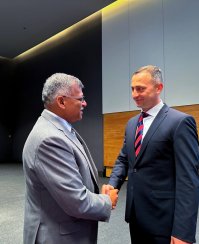Contact center of the Ukrainian Judiciary 044 207-35-46
ABOUT THE SUPREME COURT
FOR CITIZENS
ACTIVITY
PRESS-CENTER

Yevhen Synelnykov, Judge of the Supreme Court of the Civil Cassation Court, together with Anna Adamska-Gallant, Lead of the Judiciary Reform Component of the EU Project Pravo-Justice in Ukraine, attended a meeting of the Judicial Council of Singapore, which brings together all the judges of the Supreme Court of Singapore, at the invitation of the Chief Justice of the Supreme Court of Singapore, Sundaresh Menon.
Yevhen Synelnykov gave a presentation on "The Administration of Justice in Ukraine under Martial Law". He reported that, as a result of the armed aggression of the Russian Federation, 80 appellate and local courts are currently not administering justice, 122 court buildings have been damaged or completely destroyed (107 premises damaged, 15 premises completely destroyed or severely damaged). At the same time, the administration of justice has not been suspended since the beginning of the full-scale invasion.
The judge stressed that it was forbidden to shorten or accelerate any form of judicial proceedings because of martial law. If it is impossible to administer justice by the courts operating in the area where martial law has been declared, the territorial jurisdiction of the cases or the location of the courts shall be changed in accordance with the procedure established by law.
In his speech, Yevhen Synelnykov informed the judges about the Supreme Court's jurisprudence on the limited judicial immunity of the aggressor state before national courts with regard to claims for damages, and highlighted the peculiarities of notifying the defendant of the proceedings and involving him in such cases. He noted that by committing an act of aggression against Ukraine in violation of all fundamental norms of international law, the aggressor state has deprived itself of jurisdictional immunity in Ukrainian courts in this category of cases. It was the aggressive illegal behaviour of the Russian Federation, which led to terrible consequences for Ukraine and the Ukrainian people, that became the basis for the Supreme Court's conclusions on the limited jurisdictional immunity of this state on the territory of Ukraine in such cases.
The speaker stressed the need to enforce the decisions of Ukrainian courts on compensation for damage caused by the Russian Federation on the territory of other states where the property of the aggressor state is located. He noted that the judicial system was accumulating claims by Ukrainian citizens for compensation for damage caused by the armed aggression, receiving evidence confirming the existence of such damage and determining its amount. However, it is currently difficult to predict how such losses will be compensated. So far, there are no effective compensation mechanisms. At the same time, the judge expressed the hope that the relevant court decisions would be recognised and enforced by foreign courts.
The speaker also said that Ukrainian courts consider cases to determine the place of residence of children with an international element. At the same time, one of the most important factors is the child's safety, and the court must assess all the circumstances of the case and also take into account the child's views (if he or she can express them) on his or her wish to live with one of the parents.
Yevhen Synelnykov briefed the judges on the procedural difficulties and peculiarities of the administration of justice by national courts under martial law, as well as on certain categories of civil, administrative and criminal cases considered by the Supreme Court during martial law.
.jpg) |
.jpg) |
Sundaresh Menon and the judges of the Supreme Court of Singapore expressed their support for Ukraine and assured that they would provide the necessary legal assistance.
Anna Adamska-Gallant pointed out the peculiarities of the mechanisms of international legal influence on high-ranking officials whose actions and decisions led to the violation of Ukraine's sovereignty, occupation of its territories, murders, kidnapping of children, violence, etc.
Yevhen Synelnykov also met with judges of the Family Court of Singapore to discuss the effectiveness of the family court system, cooperation with child welfare authorities, custody disputes and contact between a child and a parent living apart. Yevhen Synelnykov drew attention to the words of Lee Kuan Yew, who said: "Singapore depends on the strength and influence of the family, which helps to maintain order in society, supports a culture of thrift, hard work, respect for parents and elders, and the worship of education".
During the meeting with the staff of the Supreme Court of Singapore, Yevhen Synelnykov discussed issues of corporate culture, ethics and management, and learned about the specifics of e-Justice in Singapore.
During his visit to Singapore, Yevhen Synelnykov purchased a DJI Mavic 3 mini quadcopter, which he delivered to Ukraine and presented to the 115th Separate Mechanised Brigade.
Yevhen Synelnykov's presentation - https://cutt.ly/rwQzLPHe.
.jpg)